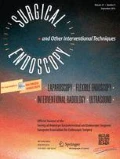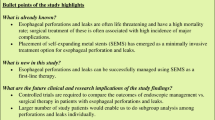Abstract
Background
Migration is the most common complication of the fully covered metallic self-expanding esophageal stent (SEMS). This study aimed to determine the potential preventive effect of proximal fixation on the mucosa by clips for patients treated with fully covered SEMS.
Methods
In this study, 44 patients (25 males, 57%) were treated with fully covered SEMS including 22 patients with esophageal stricture (4 malignant obstructions, 6 anastomotic strictures, and 12 peptic strictures) and 22 patients with fistulas or perforations (10 anastomotic leaks, 4 perforations, and 8 postbariatric surgery fistulas). The Hanarostent (n = 25), Bonastent (n = 5), Niti-S (n = 12), and HV-stent (n = 2) with diameters of 18 to 22 mm and lengths of 80 to 170 mm were used. Two to four clips (mean, 2.35 ± 0.75 clips) were used consecutively in 23 patients to fix the upper flared end of the stent with the esophageal mucosal layer. Stent migration and its consequences were collected in the follow-up assessment with statistical analysis to compare the patients with and without clip placement.
Results
No complication with clip placement was observed, and the retrieval of the stent was not unsettled by the persistence of at least one clip (12 cases). Stent migration was noted in 15 patients (34%) but in only in 3 of the 23 patients with clips (13%). The number of patients treated to prevent one stent migration was 2.23. The predictive positive value of nonmigration after placement of the clip was 87%. In the multivariate analysis, the fixation with clips was the unique independent factor for the prevention of stent migration (odds ratio, 2.3; 95% confidence interval, 0.10–0.01; p = 0.03).
Conclusions
Anchoring of the upper flare of the fully covered SEMS with the endoscopic clip is feasible and significantly reduces stent migration.

Similar content being viewed by others
References
Homs MY, Kuipers EJ, Siersema PD (2005) Palliative therapy. J Surg Oncol 92:246–256
Siersema PD (2008) Treatment options for esophageal strictures. Nat Clin Pract Gastroenterol Hepatol 5:142–152
Mougey A, Adler DG (2008) Esophageal stenting for the palliation of malignant dysphagia. J Support Oncol 6:267–273
Schembre DB (2010) Recent advances in the use of stents for esophageal disease. Gastrointest Endosc Clin North Am 20:103–121
Conio M, Repici A, Battaglia G, De Pretis G, Ghezzo L, Bittinger M, Messmann H, Demarquay JF, Blanchi S, Togni M, Conigliaro R, Filiberti R (2007) A randomized prospective comparison of self-expandable plastic stents and partially covered self-expandable metal stents in the palliation of malignant esophageal dysphagia. Am J Gastroenterol 102:2667–2677
Conigliaro R, Battaglia G, Repici A, De Pretis G, Ghezzo L, Bittinger M, Messmann H, Demarquay JF, Togni M, Blanchi S, Filiberti R, Conio M (2007) Polyflex stents for malignant oesophageal and oesophagogastric stricture: a prospective, multicentric study. Eur J Gastroenterol Hepatol 19:195–203
Wong RF, Adler DG, Hilden K, Fang JC (2008) Retrievable esophageal stents for benign indications. Dig Dis Sci 53:322–329
Holm AN, de la Mora Levy JG, Gostout CJ, Topazian MD, Baron TH (2008) Self-expanding plastic stents in treatment of benign esophageal conditions. Gastrointest Endosc 67:20–25
Bakken JC, Wong Kee Song LM, de Groen PC, de Groen PC, Baron TH (2010) Use of a fully covered self-expandable metal stent for the treatment of benign esophageal diseases. Gastrointest Endosc 72:712–720
Dua KS, Vleggaar FP, Santharam R, Siersema PD (2008) Removable self-expanding plastic esophageal stent as a continuous, nonpermanent dilator in treating refractory benign esophageal strictures: a prospective two-center study. Am J Gastroenterol 103:2988–2994
Kim ES, Jeon SW, Park SY, Cho CM, Tak WY, Kweon YO, Kim SK, Choi YH (2009) Comparison of double-layered and covered Niti-S stents for palliation of malignant dysphagia. J Gastroenterol Hepatol 24:114–119
Verschuur EM, Repici A, Kuipers EJ, Steyerberg EW, Siersema PD (2008) New design esophageal stents for the palliation of dysphagia from esophageal or gastric cardia cancer: a randomized trial. Am J Gastroenterol 103:304–312
Uitdehaag MJ, van Hooft JE, Verschuur EML, Repici A, Steyerberg EW, Fockens P, Kuipers EJ, Siersema PD (2009) A fully-covered stent (Alimaxx-E) for the palliation of malignant dysphagia: a prospective follow-up study. Gastrointest Endosc 70:1082–1089
Sharma P, Kozarek R (2010) Role of esophageal stents in benign and malignant diseases. Am J Gastroenterol 105:258–273
Kim ID, Kang DH, Choi CW, Kim HW, Jung WJ, Lee DH, Chung CW, Yoo JJ, Ryu JH (2010) Prevention of covered enteral stent migration in patients with malignant gastric outlet obstruction: a pilot study of anchoring with endoscopic clips. Scand J Gastroenterol 45:100–105
Amrani L, Ménard C, Berdah S, Emungania O, Soune PA, Subtil C, Brunet C, Grimaud JC, Barthet M (2009) From iatrogenic digestive perforation to complete anastomotic disunion: endoscopic stenting as a new concept of “stent-guided regeneration and reepithelialization”. Gastrointest Endosc 69:1282–1287
Barras C, Myers K (2000) Nitinol—its use in vascular surgery and other applications. Eur J Vasc Endo Surg 19:564–569
Burton PR, Brown W, Laurie C, Richards M, Afkari S, Yap K, Korin A, Hebbard G, O’Brien PE (2009) The effect of laparoscopic adjustable gastric bands on esophageal motility and the gastroesophageal junction: analysis using high-resolution video manometry. Obes Surg 19:905–914
Braghetto I, Lanzarini E, Korn O, Valladares H, Molina JC, Henriquez A (2010) Manometric changes of the lower esophageal sphincter after sleeve gastrectomy in obese patients. Obes Surg 20:357–362
Uitdehaag MJ, Siersema PD, Spaander MC, Vleggaar FP, Verschuur EM, Steyerberg EW, Kuipers EJ (2010) A new fully covered stent with antimigration properties for the palliation of malignant dysphagia: a prospective cohort study. Gastrointest Endosc 71:600–605
Eloubeidi MA, Lopes TL (2009) Novel removable internally fully covered self-expanding metal esophageal stent: feasibility, technique of removal, and tissue response in humans. Am J Gastroenterol 104:1374–1381
Ferreira LE, Baron TH, Wong Kee Song LM (2008) Utility of a fully covered metal stent for the treatment of benign esophageal conditions. Gastrointest Endosc 67:AB193
Verschuur EM, Homs MY, Steyerberg EW, Haringsma J, Wahab PJ, Kuipers EJ, Siersema PD (2006) A new esophageal stent design (Niti-S stent) for the prevention of migration: a prospective study in 42 patients. Gastrointest Endosc 63:134–140
Shim CS, Cho YD, Moon JH, Kim JO, Cho JY, Kim YS, Lee JS, Lee MS (2001) Fixation of a modified covered esophageal stent: its clinical usefulness for preventing stent migration. Endoscopy 33:843–848
Blackmon SH, Santora R, Schwarz P, Barroso A, Dunkin BJ (2010) Utility of removable esophageal covered self-expanding metal stents for leak and fistula management. Ann Thorac Surg 89:931–937
Manes G, Corsi F, Pallotta S, Massari A, Foschi D, Trabucchi E (2008) Fixation of a covered self-expandable metal stent by means of a polypectomy snare: an easy method to prevent stent migration. Dig Liver Dis 40:791–793
Verschuur EM, Steyerberg EW, Kuipers EJ, Siersema PD (2007) Effect of stent size on complications and recurrent dysphagia in patients with esophageal or gastric cardia cancer. Gastrointest Endosc 65:592–601
Disclosures
Geoffroy Vanbiervliet, Jérôme Filippi, Babou Soilihi Karimdjee, Nicolas Venissac, Antonio Iannelli, Amine Rahili, Emmanuel Benizri, Daniel Pop, Pascal Staccini, Albert Tran, Stéphane Schneider, Jérôme Mouroux, Jean Gugenheim, Daniel Benchimol, and Xavier Hébuterne have no conflicts of interest or financial ties to disclose.
Author information
Authors and Affiliations
Corresponding author
Rights and permissions
About this article
Cite this article
Vanbiervliet, G., Filippi, J., Karimdjee, B.S. et al. The role of clips in preventing migration of fully covered metallic esophageal stents: a pilot comparative study. Surg Endosc 26, 53–59 (2012). https://doi.org/10.1007/s00464-011-1827-6
Received:
Accepted:
Published:
Issue Date:
DOI: https://doi.org/10.1007/s00464-011-1827-6




